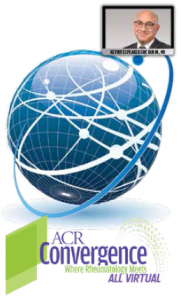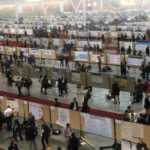
Dr. Eric Rubin is this year’s keynote lecturer.
Looking back on last year’s ACR/ARP annual meeting, I recall the energy and excitement of attendees as they participated in sessions covering the latest scientific concepts and new directions in our field. In 2019, we piloted a number of innovative ways to modernize and enhance future ACR meetings, with the promise of delivering a transformed annual meeting in 2020. No one could have predicted then how extensive this transformation would be or that this year’s annual meeting, ACR Convergence 2020, would go down in history as our first fully virtual annual meeting.
In a few short months, the Annual Meeting Planning Committee (AMPC), dedicated ACR leaders and talented ACR staff have collaborated to reimagine all aspects of the meeting, with the goal of creating an all-virtual, interactive environment for the global rheumatology community. This meeting will provide a forum to present the highest quality educational content in a way that allows everyone to participate and learn, with the unified purpose of improving patient care.
2020 Program
When viewing the program, the first significant change you will see is the day and time of the Opening Ceremony. This session will be held on Thursday, Nov. 5, at 2 p.m. EST and will include the presidential address and the keynote lecture. In addition, we will recognize the ACR’s Gold Medal Award recipient and present the always popular Year in Review.
The 2020 keynote lecturer is Eric Rubin, MD, editor in chief of The New England Journal of Medicine, chair of the Department of Immunology and Infectious Diseases at the Harvard T.H. Chan School of Public Health, Boston, and the Irene Heinz Given Professor of Immunology and Infectious Diseases. Dr. Rubin is a recognized leader in the field who is known for his groundbreaking research on tuberculosis and his dedication to often neglected patient populations. I anticipate this presentation—when Dr. Rubin will share his perspectives on the SARS-CoV-2 pandemic from the standpoint of one at the forefront of new data analysis and dissemination—will be a highlight of the meeting.
Also, Jinoos Yazdany, MD, MPH, and Richard J. Bucala, MD, PhD, will present the Year in Review, synthesizing many new advances into a 60-minute presentation—a daunting task, but I have full confidence they will do justice to this extraordinary year.
Participants can expect cutting-edge science presented by experts in the field, along with ways to connect with speakers and colleagues. The AMPC, chaired by Victoria Shanmugam, MD, director, Division of Rheumatology, George Washington University Medical Faculty Associates, Washington, D.C., has led the development of a rigorous scientific program.
We are also thrilled to announce that Anthony S. Fauci, MD, ACR Master and director of the National Institute of Allergy and Infectious Diseases (NIAID), will give a live presentation on Saturday, Nov. 7, at 4 p.m. EST. You may recall that Dr. Fauci delivered the 2017 ACR Keynote Lecture on vaccine development during epidemics.
Logistics
To assist with scheduling to accommodate meeting participants in different time zones, we have divided the daily educational sessions into two time blocks: 10 a.m.–1 p.m. EST; 3–6 p.m. EST. Each educational block will include oral abstracts and invited speaker presentations. These are designed to provide live content and time for a question-and-answer (Q&A) period, wherever possible, as well as opportunities for interaction with peers during normal waking hours—at least in one time zone.
Between educational time blocks, participants will have the opportunity to access community hubs, a unique feature that allows attendees to engage with experts and connect with peers who share the same research or clinical interests. Each community hub will be co-hosted by leaders in the field and will include a mix of formal and informal networking opportunities, including study groups.
We will offer opportunities to attend special events and visit the virtual exhibits. To create greater opportunities for engagement, all participants will have the option to request meetings and schedule private group meetings within the new platform.
We also plan to offer selected presentations as encore sessions with live Q&A. This will allow for a second viewing opportunity for participants to engage
with speakers.
In addition, all content will be available on demand following the live session, so attendees can watch their choice of sessions at a later, convenient time.
Poster presentations will be held daily from Friday, Nov. 6 through Monday, Nov. 9. Participants will have the option to listen to a five-minute audio recording for each poster, as well as view the abstracts and posters and engage with presenters daily from 9–11 a.m. EST and through private meetings.
In addition to new session formats on timely topics, such as COVID-19, your traditional favorites will still be offered, including The Great Debate. This year we will see Vibeke Strand, MD, and Michael Weinblatt, MD, square off on the question of whether Janus kinase inhibitors should or should not be used before biologics in rheumatoid arthritis patients who have failed methotrexate. A special Closing Session will also be offered this year.
Another substantial change to the meeting involves the timing of the pre-meeting courses. The Review Course will be held on Tuesday, Nov. 10. The Basic Research Conference, titled Rheumatology in the Molecular Dimension: Insights from Single-Cell and -Omics Technology, and the Clinical Research Conference, titled Optimizing RCTs in Rheumatology—Past, Present and Future, will be held on Saturday, Nov. 21. Based on focus group feedback, we believe this revised scheduling will allow for greater global participation and help mitigate virtual fatigue.
Several special events will also be incorporated into the meeting, and we will be honoring the 2020 Masters and award recipients throughout the meeting.
In Sum
Future generations will refer to 2020 as the year rheumatology education was transformed. I hope you will make plans to join us at this unique time in history.
 Ellen M. Gravallese, MD, is chief of the Division of Rheumatology, Inflammation and Immunity at Brigham and Women’s Hospital, Harvard Medical School, Boston. She is the 83rd president of the ACR.
Ellen M. Gravallese, MD, is chief of the Division of Rheumatology, Inflammation and Immunity at Brigham and Women’s Hospital, Harvard Medical School, Boston. She is the 83rd president of the ACR.



